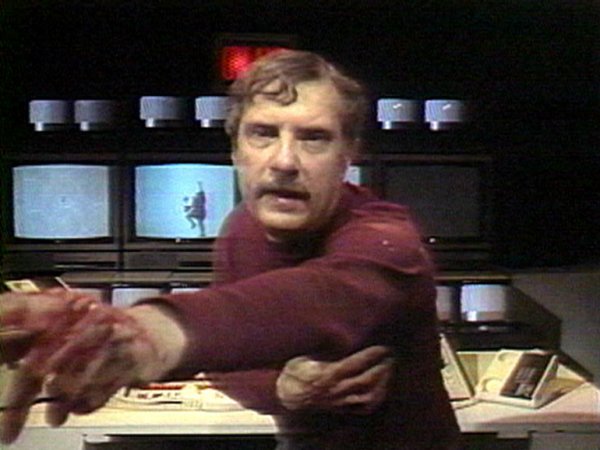Are you ready to...
Talks and screenings
Program of talks and screenings based on case studies from the exhibiton.
This project has several extensions: a website, a Twitter account, a publication, a Vimeo video channel, the e ducational project Zero TV. Follow the updates on Twitter.

Programme
Friday November 5 at 7 pm
Are you ready to... EXHIBIT?
Round table with Dora García, Chus Martínez, Pere Portabella and Albert Serra
Some of the participants from the exhibition Are you Ready for TV? will discuss the grammar of the visual categories forged by television and their relationship to art, in a round table moderated by the curator of the project, Chus Martínez.
Thursday November 18 at 7 pm
Are you ready to... BROWSE?
Case Study: YouTube Me and I tube you by Johan Grimonprez
Thursday January 20, at 7 pm
Are you Ready to... SPECULATE?
Case study: Philosophy programs on ORTF
By Tamara Chaplin
Monday February 21, at 7 pm
Are you Ready to... RELATE?
Case study: Marta Traba, educational television in Colombia
By Nicolás Gómez Echeverri
Monday March 14, at 7 pm
Are you Ready to... EDUCATE?
Case study: Pioneer cultural programs in Spain
Round table with Andrés Hispano and Manuel Huerga
This session reflects on the subject of cultural programming in Spain by looking at some of the cultural broadcasting projects that broke new ground in television due to their high quality and open nature. The talk will examine programs such as Encuentros con las artes y las letras, Trazos and La edad de oro on Spanish television network RTVE, as well as other projects that began to emerge with the creation of autonomous community and local channels, such as Estoc de pop and Arsenal on TV3 and Boing Boing Buddha on BTV.
Participants
Tamara Chaplin, associate professor of History at the University of Illinois, specialises in the cultural and intellectual history of modern France, and the history of sexuality, human rights and the media. In her book Turning On the Mind: French Philosophers on Television (University of Chicago Press, 2007) she argues that the history of the televising of philosophy in France is crucial to understanding the struggle over French national identity in the postwar period. The lecture will be accompanied by a screening of excerpts from ORTF programs.
Nicolás Gómez Echeverri is an artist and researcher in the field of art history. He is the author of En blanco y negro. Marta Traba en la televisión colombiana, 1954-1958 (Universidad de Los Andes, 2008), which looks at the artistic education programs conceived and produced for Columbian television by the writer and art historian Marta Traba (Buenos Aires, 1930 – Madrid 1983), a selection of which is included in the exhibition. Sequences from some of these programs produced in the seventies and eighties will be screened along with the talk.
Johan Grimonprez, filmmaker and lecturer at the New York School of Visual Arts, first came into the public eye with his film essay Dial H-I-S-T-OR-Y. Premiered at the Centre Pompidou and Documenta X in Kassel in 1997, it tells the story of aircraft highjacking since the seventies, and seems to foreshadow the events of September 11, 2001. His 2005 film, Looking for Alfred, plays with the theme of the double based on the figure of Alfred Hitchcock, and won the International Media Award (ZKM, Germany) and the European Media Award. Grimonprez's works have travelled to film festivals around the world, and are included in important collections such as the Centre Georges Pompidou in Paris, Kanazawa Art Museum in Japan, Nationalgalerie and Neue Nationalgalerie, Berlin, and Lousiana Museum of Modern Art, Denmark.
Andrés Hispano is a curator and film and video maker who has written and produced programs on experimental film for Canal Plus, as well as numerous programs about film, music and culture in general for local channel BTV, including Boing Boing Buddha (2001-2004), which he co-directed with Manuel Huerga. He has curated exhibitions such as El rei de la casa (La Virreina, 2007), and is the author of David Lynch. Claroscuro americano (Glénat, 1998). He teaches at Universitat Pompeu Fabra and contributes to the La Vanguardia cultural supplement Cultura/s.
Manuel Huerga is a filmmaker and a television and theatre director, and a pioneer in the field of experimental video. His television programs include Estoc de pop (1983-1985) and Arsenal (1985-1987) for TV3, and Boing Boing Buddha for BTV, the local Barcelona channel that he directed until 2003. He has directed feature films such as Antártida (1995) and Salvador (2005). In the course of his extensive career in the cultural world, he has been involved in organising projects such as the exhibition Món TV and the Videoteca Informatizada de Barcelona (VIBA), and archive that digitalises the city's audiovisual heritage.
Tel. (+34) 93 481 46 81
programespublics [at] macba [dot] cat









